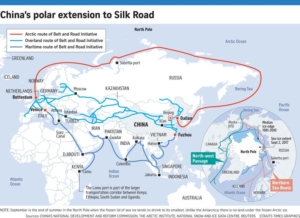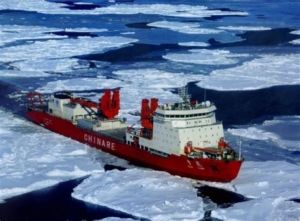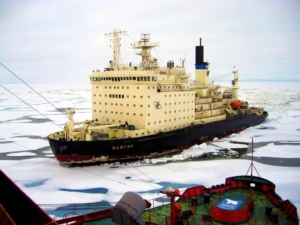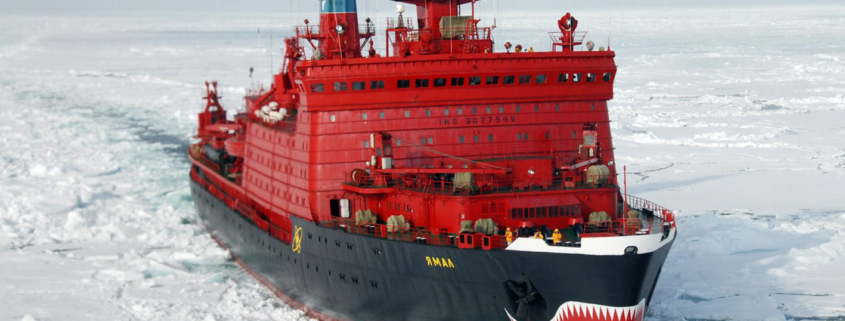Northern Sea Route and China’s Belt and Road Initiative in a post-Covid-19 world
The Covid-19 virus makes it clear once more that the world has to deal with numerous global challenges. Peace & security. Climate change. Biodiversity. Economy and well-being. In short: the challenge to meet the global Sustainable Developments Goals. Global and regional collective and collaborative leadership is required in order to enable mankind to achieve these goals.
Various scenarios for the post Covid-19 world have been identified by The Hague Centre for Strategic Studies in their paper “Divided We Stand? Towards Post-Corona Leadership”:
- West to East Power Shift Accelerated.
- The End of Globalization as We Know it.
- Fragmentation and Failed States.
- A More Stable and Cooperating World.
Development of the Northern Sea Route might become a key factor in Russia’s attempt to increase their role in East-West trade and transport in a post-Covid-19 world. Depending internal economic and political developments in Russia, and depending which of the above scenario’s will become reality, it remains to be seen whether Russia will be able to increase their influence and to develop the Northern Sea Route to their benefit. However, the Russian Government recently approved a Northern Sea Route Infrastructure Development Plan for the period up to 2035. Maxim Kulinko, Deputy Head of the Northern Sea Route (NSR) Directorate and Head of Rosatom’s Department for Development of NSR and Coastal Territories, said on various occasions that a year-round operation on the Northern Sea Route will start from 2025.

Xi Jinping, China’s strong leader, can adapt leadership and foreign policy to various scenarios. He prefers to avoid military conflict but to lead China to a central position in global economy. The Belt and Road Initiative should boost China’s global role and support its aim to take a central role in global economy.
The Chinese governement noted the (expected) economic decline and arrived at the conclusion that globalization has come under pressure in the wake of the Covid-19 pandemic.
Since China under Xi Jinping aims to become world leader they don’t miss a chance to emphasize that global institutions have struggled to deal with the challenges of Covid-19. They arrived at the conclusion that the UN and other global organizations have found their ability to respond to the pandemic hampered by a lack of capabilities and multilateral consensus. To the opinion of the Chinese rulers the absence of adequate institutions to guide and manage cross-border flows has resulted in an unbalanced form of globalization.
But China is ready to lend a helping hand: “The world now faces challenges on three fronts from a public health crisis, economic recession, and political fallout from the pandemic, which has put more strain on globalization and multilateral cooperation. Yet, this unprecedented situation also offers a unique chance to reassess and improve the way we manage globalization so it can deliver benefits to all. As a rising economic power and supporter of multilateralism and globalization, China can help achieve this by playing a key role in the much needed reform of global governance.”.
In the first place China is supporting regional integration in the Asia-Pacific region. Second, at the global level, China is exploring ways to work with key players in forging what they see as new global governance solutions. The Belt and Road financial institutions are being made instrumental to the global fight against Covid-19 and help maintain steady economic growth.
Obviously, China will continue with even more effort to use their Belt and Road Initiative to increase their power and global influence, also in Europe and also in the maritime and transport sector and infrastructure.

Since Russia is the junior partner of China in regard to economy and security, and the country is not expected to be able to reclaim an important role on the global playing field shortly, China might try to get greater influence on the Northern Sea Route.
The Netherlands, Belgium, France, Italy, Greece, Germany and other European countries, with their huge and important sea ports, have to my opinion no alternative than to bet on strengthening Europe in order to be able to respond to developments initiated by China and Russia regarding the Northern Sea Route and the Belt and Road Initiative. Europe should show the collective and collaborative leadership that is required, in the interest of the well-being of all Europeans.


[See for the Chinese point of view: Belt and Road Portal (https://eng.yidaiyilu.gov.cn/)]

